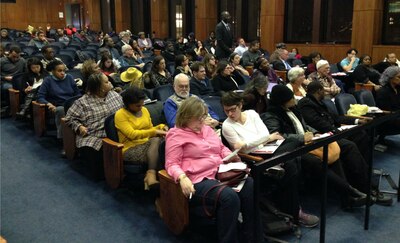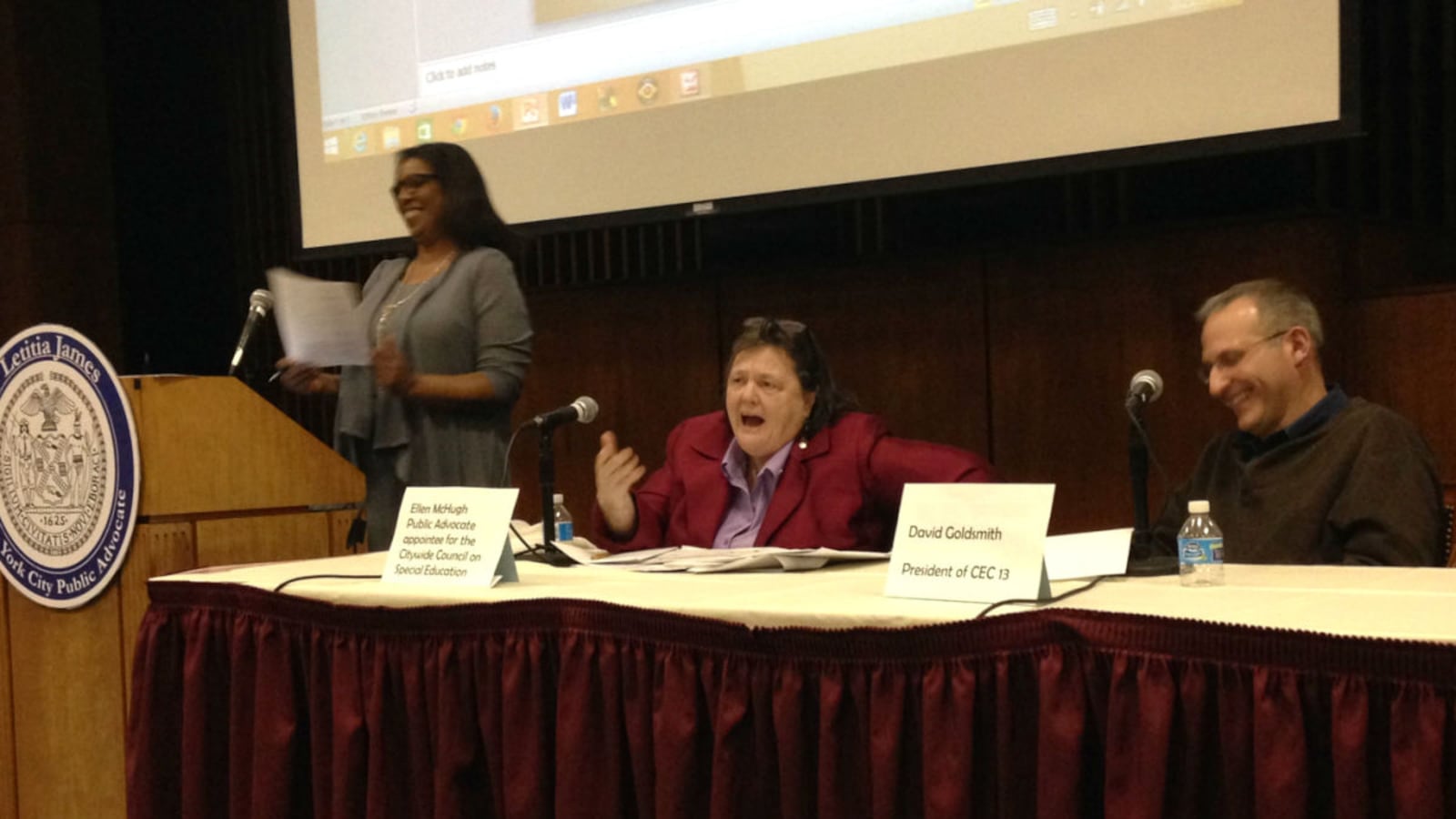Public Advocate Letitia James picked a good moment to kick off a series of forums on the future of a state law that gives the mayor control of the city’s schools.
The week started with critics saying the city’s plan to award a vast school-technology contract to a company implicated in an earlier scandal highlighted the limited powers of the oversight panel created by the mayoral control law.
Then, Mayor Bill de Blasio argued in Albany against the governor’s plan to let outside groups take over struggling schools, and asked lawmakers to permanently extend the mayoral control law. That prompted Gov. Andrew Cuomo to repeat his position that the law should be renewed for just three years.
Amid the clamor, James hosted the first of five forums about the role the public should play in a mayor-run school system on Wednesday, offering a preview of the debate likely to play out in the coming months as lawmakers decide whether to renew the law before it expires in June.
The event started with the idea that state lawmakers will likely keep the law intact, but that they could still amend it. And while the dozens of parents and advocates who attended the Brooklyn forum shared different thoughts on how they should do that, almost all agreed that parents and the public deserve real authority in the school system.
“With mayoral control, whether it’s in or out, there just needs to be a lot more local control,” said Laurie Windsor, president of the community education council in Brooklyn’s District 20. “Definitely more local.”
At the urging of then-Mayor Michael Bloomberg, the state legislature passed a law in 2002 that dismantled the city’s 32 locally elected school boards. Under the centralized system, the mayor now has the power to choose the schools chancellor, oversee the system’s $20 billion operating budget, and set policies for the city’s 1,600 district schools.
After months of debate over Bloomberg’s use of the law to make major changes to the school system, state lawmakers voted in 2009 to renew it. While that vote made minor changes to the law, people who spoke at Wednesday’s forum said it still left the mayor with too much unchecked power.
Their prime example was the Panel for Educational Policy, or PEP, the oversight board that voted Wednesday to approve the controversial tech contract. (James and others had criticized the city for sharing few details about the $637 million deal with the panel or the public.)
Attendees said the panel receives too little information to make informed decisions about education department contracts, and that it lacks independence since the mayor appoints the majority of its 13 members and can remove them at will. Echoing a report commissioned by an earlier public advocate, some said panel members should serve fixed term limits to counter any political interference — a proposal that de Blasio supported during the mayoral campaign. Others said the chancellor should no longer be a panel member.

“I think changing the nature of the PEP is a critical part of creating checks and balances,” said David Goldsmith, president of the community education council in Brooklyn’s District 13.
The forum included many members of the city’s 32 community education councils, or CECs, and its citywide councils on high schools, English learners, and students with disabilities. These volunteer advisory groups were formed after the local community boards were abolished, and many speakers Wednesday said their input is routinely ignored.
For instance, state law says the groups must be consulted when district superintendents are hired, but the speakers said they should also be able to propose candidates. The law also says the citywide councils must produce annual reports, but members said the law should order the education department to respond to them.
Ellen McHugh, James’ appointee to the citywide council on special education, said the department answered the group’s latest report with “marvelous silence.”
“If we are required by law to produce these reports,” she said, “they should also be required by law to respond to us.”
While many of the speakers wanted to reform the mayoral control law, some said it should be abolished and the local boards reinstated. But all seemed to agree that the current system leaves many students’ families feeling confused and powerless.
Some said the city encourages parents to help students with homework or raise money for classroom activities, but disregards their input on critical matters, like where new schools should be located. Rather than feeling like partners with the school system, many parents feel shunned by it, they said.
“I was left out in the cold,” said Janet Roberts, who has three children with disabilities, including one who attends P.S. 55 in Queens. “No one taught me how to navigate the system with special-needs kids.”
Wiley Novell, a spokesman for the mayor, would not say whether de Blasio supports any of the proposed reforms to the mayoral control law. But he did say the administration has tried to draw parents into the system in several ways, such as recruiting parents to join the CECs, having the chancellor meet monthly with the CEC presidents, and adding more parent-teacher conferences.
The administration has “dramatically increased opportunities for parent involvement using tools that too often went unused under mayoral control,” Norvell said in a statement. “These are real changes that will ensure families’ voices are heard.”


